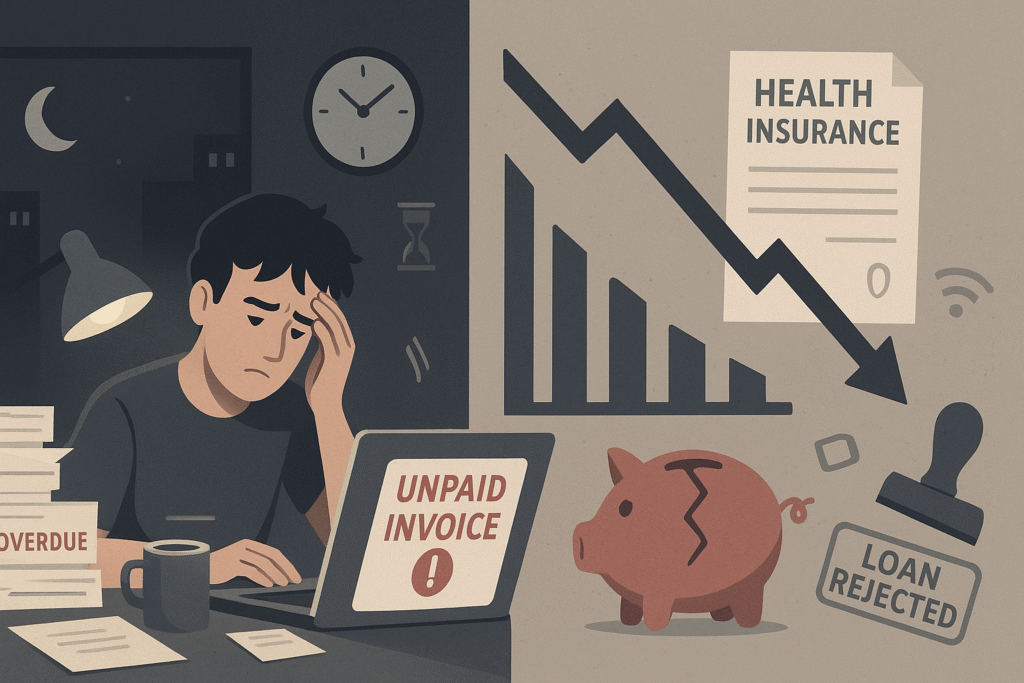Introduction
Freelancing isn’t just a side hustle anymore — it’s a full-blown career path reshaping the global job market. From creative designers in New York to virtual assistants in Dubai, millions are trading cubicles for coffee shops, fixed salaries for flexible schedules.
But here’s the truth: it’s not all sunshine, home offices, and midday naps.
In this guide, we’ll unpack the Top 10 Pros and Cons of Freelancing so you can see both sides of the coin — the freedom, the risks, and everything in between. By the end, you’ll know whether freelancing is your dream career… or just a good fantasy.
Table of Contents
The Top 10 Pros of Freelancing

(Because let’s be honest — this is why we’re tempted in the first place)
1. Flexibility in Work Hours and Location
Say goodbye to alarm-clock tyranny. Freelancers set their own schedules and work from anywhere with Wi-Fi — from a beachfront Airbnb to your couch in sweatpants.
2. Be Your Own Boss
You pick your projects, choose your clients, and set your rates. No middle managers, no corporate politics — just you and your business decisions.
3. Unlimited Earning Potential
A salary caps you. Freelancing doesn’t. More clients, higher rates, extra services — the more you put in, the more you can earn.
4. Diverse and Exciting Projects
One week you’re writing for a travel blog, the next you’re designing a logo for a tech startup. Variety keeps your portfolio — and your brain — fresh.
5. Skill Expansion and Personal Development
Every client brings new challenges, pushing you to learn and grow faster than most 9-to-5 jobs ever could.
6. Better Work-Life Balance
Scale up when you need extra cash, scale down when life demands it. You decide the pace.
7. Access to Global Opportunities
Your clients aren’t just local — they’re global. Time zones may be tricky, but the opportunities are endless.
8. Tax Benefits and Deductions
Office equipment, software, internet — all potential deductions that can reduce your taxable income.
9. Networking and Building Your Own Brand
Your name becomes your business card. Every project is a chance to market yourself.
10. No Office Politics
Work without the drama, forced team-building exercises, or endless meetings that could’ve been emails.
The Top 10 Cons of Freelancing

(The side nobody flexes on Instagram)
1. Income Instability
Some months you’re rolling in projects, others you’re refreshing your inbox in despair. Budgeting gets tricky.
2. No Employee Benefits
Forget company-paid health insurance, sick leave, or retirement plans. It’s all on you.
3. Work-Life Balance Can Be Hard to Maintain
Without boundaries, work bleeds into personal time — especially when your “office” is your living room.
4. Isolation and Loneliness
No co-workers to grab lunch with. It’s just you, your laptop, and maybe a cat.
5. Responsible for Everything
Marketing, accounting, contracts, taxes — congratulations, you’re also your own admin department.
6. Difficulties with Client Payment
Some clients pay late. Some… don’t pay at all. Chasing invoices becomes part of the job.
7. Career Advancement Challenges
No promotions or titles handed to you. You must actively build skills, reputation, and networks.
8. Higher Self-Employment Taxes
You cover both the employer and employee tax portions. Plus, quarterly filings — fun times.
9. Initial Investment and Expenses
Laptops, software, website, marketing — freelancing often comes with an upfront price tag.
10. Challenges in Obtaining Loans or Rentals
Banks and landlords can see irregular income as risky, making approvals harder.
Quick Glance: Pros vs. Cons
| Pros | Cons |
| Flexible hours & location | Income instability |
| Be your own boss | No benefits |
| Unlimited earning potential | Work-life balance struggles |
| Variety in projects | Isolation |
| Skill growth | Admin overload |
| Better work-life control | Payment issues |
| Global opportunities | Career growth challenges |
| Tax deductions | Higher self-employment taxes |
| Build your brand | Startup expenses |
| No office politics | Loan/rental hurdles |
Is Freelancing Right for You?
Ask yourself:
- Do I thrive on independence?
- Can I handle uncertainty?
- Am I disciplined enough to manage my own schedule?
If your answers lean toward “yes,” freelancing might just be your career match.
Tips to Maximize the Pros and Minimize the Cons
- Build an emergency fund before starting.
- Use contracts to protect yourself.
- Schedule regular social interaction to avoid loneliness.
- Keep learning and upskilling to stay competitive.
Conclusion
Freelancing offers freedom, variety, and potential like no other career — but it also demands resilience, self-discipline, and financial savvy. By understanding the Top 10 Pros and Cons of Freelancing, you’re already ahead of most beginners.
If you decide to take the leap, remember: you’re building more than a career — you’re building a life on your terms.
FAQs
1. What are the Top 10 Pros and Cons of Freelancing for beginners?
The Top 10 Pros and Cons of Freelancing include benefits like flexibility, global client access, and better work-life balance, along with challenges such as inconsistent income, lack of job security, and self-discipline requirements. Beginners should weigh these factors before committing to a freelancing career.
2. Is freelancing worth it despite the Top 10 Pros and Cons of Freelancing?
Yes, freelancing can be worth it if the advantages align with your goals. The Top 10 Pros and Cons of Freelancing help you understand whether the freedom and earning potential outweigh the instability and workload management challenges.
3. How can I manage the risks mentioned in the Top 10 Pros and Cons of Freelancing?
To handle the risks in the Top 10 Pros and Cons of Freelancing, create an emergency fund, set a stable client base, use contracts, and maintain a healthy work-life schedule. Proper planning helps you enjoy the perks without being overwhelmed by the downsides.
💡 Pro Tip: Bookmark this guide and share it with anyone considering freelancing. The more informed you are, the better your chances of success.











